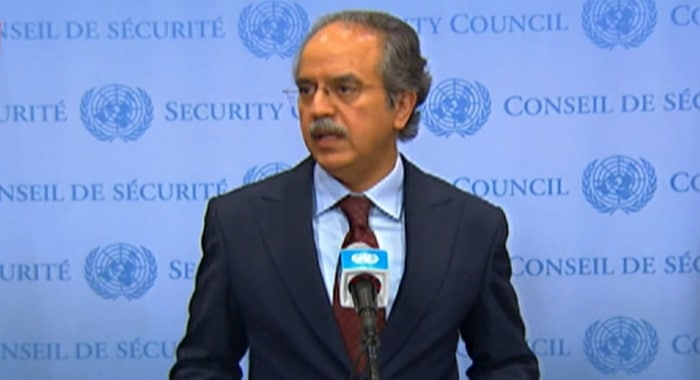Pakistan has categorically rejected India’s baseless allegations regarding the Pahalgam incident during a closed-door session of the United Nations Security Council (UNSC), which was convened at Pakistan’s request to address rising regional tensions.
Speaking to the media following the meeting, Pakistan’s Permanent Representative to the UN, Ambassador Asim Iftikhar, stated that Pakistan had no connection whatsoever to the Pahalgam incident. He warned that India’s provocative actions pose a serious threat to peace and security in South Asia. “Pakistan will resolutely defend its sovereignty and territorial integrity under all circumstances,” he asserted.
The special in-camera session was attended by all 15 members of the Security Council, including the five permanent members. Pakistan briefed the Council on India’s inflammatory rhetoric and destabilizing steps, which have escalated tensions in the region. Particular attention was drawn to India’s unilateral and illegal move to suspend the Indus Waters Treaty—an action that directly undermines a foundational international agreement on water sharing.
Pakistan urged the Security Council to take cognizance of the growing threats to regional stability and called for immediate steps to de-escalate the situation. The Council also deliberated on the Jammu and Kashmir dispute in the backdrop of renewed Pakistan-India tensions, marking the first such discussion in over five years.
Meanwhile, Pakistan’s Ambassador to the United States, Rizwan Saeed Sheikh, briefed a prominent American think tank, emphasizing Pakistan’s call for an impartial and transparent investigation into the Pahalgam incident. He highlighted that India has presented no evidence to support its allegations, yet continues its campaign of blame and aggression.
“The Indian government’s war hysteria is a grave danger to regional peace,” Ambassador Sheikh stated. “Pakistan, as one of the countries most affected by terrorism, believes in peace with dignity and mutual respect.”
He further condemned India’s conduct regarding the Indus Waters Treaty, calling it a clear breach of international norms. “India’s actions are rooted in lawlessness,” he said, warning that any attempt to disrupt Pakistan’s water supply would be regarded as an act of war. “Water is Pakistan’s lifeline, and we will defend it at all costs,” he added.
It is noteworthy that following the April 22 attack on local tourists in Pahalgam, the Indian government launched a baseless propaganda campaign against Pakistan. In a series of hostile moves, India unilaterally suspended the Indus Waters Treaty, ordered Pakistani diplomats to leave by April 30, 2025, and revoked visas for Pakistani citizens—further inflaming tensions.
Pakistan’s National Security Committee, in response, adopted a robust diplomatic strategy and imposed reciprocal limits on Indian diplomatic staff, capping their presence at 30 individuals. The Committee reiterated that any attempt to weaponize water against Pakistan would be treated as a declaration of war.





